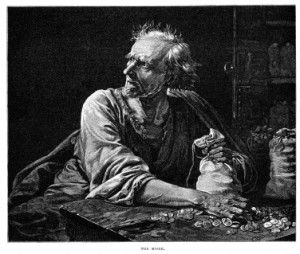
With the release of the new Wall Street film, and its treatment of the financial crisis in the fall of 2008, the issue of whether “greed is good” is back on the table. Director Oliver Stone, like many others, will almost certainly use that film to show that greed was the primary cause of the bubble that led to the recession under which we now suffer. But he, like those others, would be wrong: the fundamental cause is misguided government regulation that channeled greed in ways that were destructive.
Greed is like gravity: it’s omnipresent. People are always self-interested. The question is how political and economic institutions work to harmonize that self-interest with providing benefits to others. Just as we wouldn’t blame gravity if several planes crashed on the same day, we can’t blame greed for the crisis and recession.
Instead, we need to look at how government policy skewed the incentives facing people, leading them to make so many bad decisions. The first of those policies was the Federal Reserve System keeping interest rates far too low after 9/11, actually producing negative real interest rates for a couple of years. When people are, effectively, being paid to borrow, you can bet they will do so. Flush with funds, banks and other institutions began to lend quite freely. This wasn’t some abnormal degree of greed, but simply a self-interested response to the cheap credit made available by the government’s central bank.
The cheap credit found its way into the housing market also thanks to a variety of government policies. Fannie Mae and Freddie Mac were key players here, as these government-sponsored enterprises were given privileged access to credit as well as an implicit guarantee of taxpayer support should they run into trouble. Their mission was to be prepared to buy up new mortgages and package them together like a bond to sell to investors.
Without a clear profit or loss bottom line, there was little incentive for Fannie and Freddie to be overly concered with the quality of the mortgages they bought. As the flow of cheap credit continued to fuel housing sales, rising home prices made these mortgage-backed securities to seem like a terrific investment. Here too, it was not some ratcheting up of greed that caused the problems, but instead the ways in which government policy in the form of Fannie and Freddie distorted market incentives to make bad investments look more attractive to self-interested investors.
The best way to avoid booms and bubbles that eventually lead to crises and recessions is to keep government, whether in the form of a central bank or bad policy, out of the market as much as possible so that it cannot distort incentives facing market actors. There’s no way to make humans less self-interested, but what we can to is make sure that we don’t adopt institutions and policies channel that self-interest into socially harmful activities.
Author: Steven Horwitz
Charles A. Dana Professor of Economics
St. Lawrence University




Ronald Reagan said it, and many others before said something similar:
Government isn’t the solution. Government is the problem.